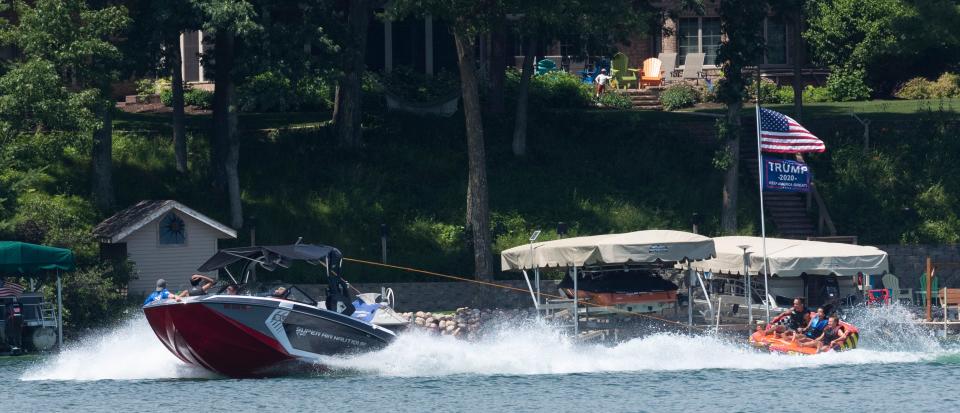Wisconsin residents are asking for action on the problems caused by wake boats

Public concerns about damage caused by wake boats in Wisconsin have resulted in requests by Natural Resources Board members for action, including new laws, to address the issues.
Wake boats are power craft with special ballast tanks designed to increase their displacement and create larger than normal waves for surfing or tubing. Several thousand pounds of lake water are commonly taken into the tanks to increase the wake.
Use of the boats has increased markedly in recent years, according to Darren Kuhn, DNR boating law administrator.
"(Wake boating) is definitely a hot topic and it is definitely a growing sport in popularity," Kuhn said at Wednesday's NRB meeting in Madison.
It's also drawing more scrutiny.
Paul A. Smith:Smith: Avian flu outbreak especially worrisome for endangered whooping cranes
More: Bald eagle found with gunshot wound in Franklin has died; Wisconsin DNR is asking for tips
More:DNR seeking tips on illegal elk killings that occurred during gun deer season
Issues arise when the wake poses a danger to other boaters, habitat and wildlife, according to several state residents who have testified at board meetings over the last year.
The prop wash can also scour the lake bottom and damage aquatic vegetation. Further, the ballast tanks present serious risks for transfer of aquatic invasive species.
The DNR has urged boaters to be aware of the risks and problems caused by boat wakes and to take steps to reduce big wakes. A July 2019 DNR press release included the messages "Others are sharing the waters – keep wakes in check" and "Own Your Wake – for everyone's sake."
Wake boating has been a topic at several NRB meetings over the last 14 months, including in October 2021 when board member Bill Smith asked DNR staff about damage caused by the power boats and at least twice this year when state residents testified with their concerns.
"The problem is the wakes create a safety hazard to everyone else using the lake, damage the environment, destroy personal property and erode the shoreline," said Jeff Meessmann of Presque Isle at the September board meeting.
Kuhn, the DNR's boating law administrator, gave the board a presentation on enforcement issues related to wake boats at Wednesday's meeting.
Several state statutes already apply to wake boats, Kuhn said. All boats are required to proceed at no wake speed when within 100 feet of any shoreline, dock or pier.
More:Outdoors calendar
Second is a law regulating wake which states "no person shall operate a motorboat so as to approach or pass another boat in such a manner as to create a hazardous wake or wash."
Third are statutes pertaining to AIS, including one that requires anyone who removes a boat from any inland or outlying water to immediately drain all water, including from ballast tanks.
Violations of those statutes result in civil forfeitures, or citations, Kuhn said.
Wake boat operators also could be charged with a potential criminal violation called "negligent operation." It states no person may operate or use any boat in a careless, negligent or reckless manner so as to endanger that person's life or property or the life, property or person of another."
DNR wardens have direct authority to enforce all of those laws statewide, Kuhn said.
In addition municipalities may enact local boating ordinances in the interest of public health, safety or welfare, including the public's interest in preserving the state's natural resources.
Examples include areas of waters with reduced speed zones and limiting boating activities by time of day. A municipality could also enact an ordinance effectively banning wake boats.
However, DNR conservation wardens don't have authority to enforce such local rules, Kuhn said.
And a wake boat scouring the bottom of the lake with its prop wash isn't violating any existing state regulation or law, Kuhn said.
The patchwork of enforcement and concern over increased use of wake boats prompted board member Terry Hilgenberg to suggest new state laws to allow wardens to enforce local rules and to require manufacturers of wake boats to change the design of the ballast tanks to allow inspection.
"I'm not in a position to say we need new laws," Kuhn said. "But if a legislator chose to go that route I'd be more than willing to sit down with them to further our mission."
Smith said the DNR was called to take up the wake boating issues as part of its public trust responsibilities to protect the resources.
"This is an issue that is developing rapidly and it might be a lot more effective and efficient to address it on the front end instead of presented with problems down the line," Smith said.
Sarry Barry, DNR deputy secretary, said the agency would take the suggestions under advisement and has been supportive of conversations with legislators about moving forward with legislation.
Wildlife bill down to the wire
Supporters of the Recovering America’s Wildlife Act know time has nearly expired in the 117th Congress but are still hopeful the bill will pass in the coming weeks.
The most likely prospect for RAWA, which would provide $1.4 billion a year to states and tribes to implement wildlife action plans for non-game species, is to be included in the omnibus spending package expected to be finalized in the coming days, according to several supporters of the proposal.
The bill passed the House and a Senate committee but has not received a vote from the full Senate. It has enjoyed bipartisan support and has about 40 cosponsors in the Senate, including 16 Republicans.
Our subscribers make this reporting possible. Please consider supporting local journalism by subscribing to the Journal Sentinel at jsonline.com/deal.
DOWNLOAD THE APP: Get the latest news, sports and more
This article originally appeared on Milwaukee Journal Sentinel: Wisconsin residents seek to minimize damage to nature from wake boats

 money
money 